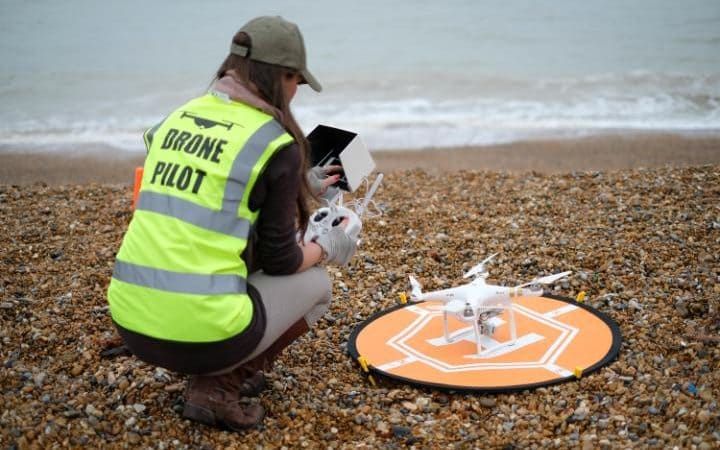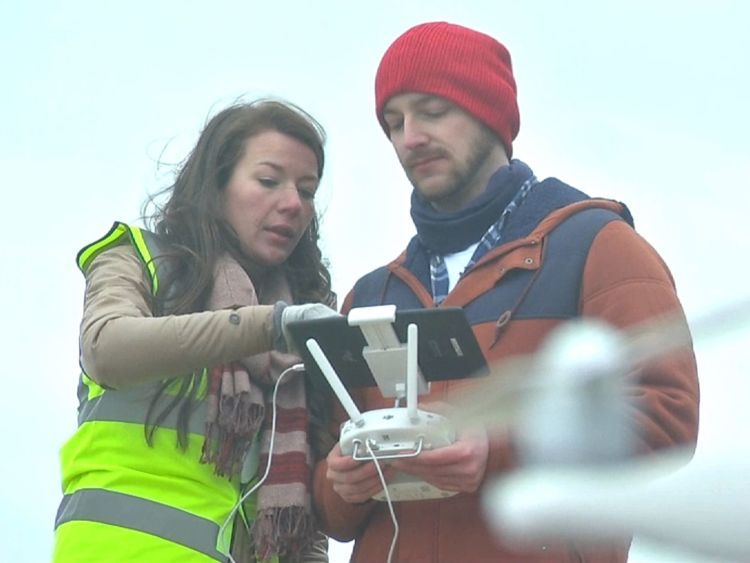Drones Fight Against Plastic Pollution on UK Beaches
Published on by Water Network Research, Official research team of The Water Network in Technology
Using off-the-shelf components and a desire to put a dent in a huge problem, researchers tackle plastic pollution on beaches.

Ellie MacKay is co-director of the Plastic Tide CREDIT: CHRISTOPHER PLEDGER
On a beach in Kent, Peter Koehler and Ellie Mackay are teaching a drone how to see.
Their project, Plastic Tide, aims to create software that will automatically pick out the pieces of plastic that wash up here on the shingle.
"One of the major challenges we face is that we can only account for 1% of those millions and millions of tonnes of plastic that are coming into our oceans every year," Mr Koehler told Sky News.
"So the question is, where is that 99% going?"
He added: "We just don't know. It could be in the water, it could be in wildlife, or it could be on beaches.
"And so what the Plastic Tide is doing, it's using drone technology to image beaches in a way that's never been done before, on a scientific scale. So that you can build up a picture of how much of that missing 99% is washing up on our beaches."
Mr Koehler and Ms Mackay use an off-the-shelf drone. They select the area of beach they want to film and a free app comes up with a survey pattern flight path - the drone moves systematically up and down the beach as if it were ploughing it.
The images taken are then uploaded to a scientific crowd-sourcing platform called Zooniverse.
Anyone can log on, look at the images and tag bits of plastic in them.
That will build up a huge amount of data, which will be used to train a machine-learning algorithm to spot plastic by itself - no humans required.

Peter Koehler and Ellie Mackay are building up a picture of how plastic is washing up on beaches
The hope is that, eventually, anyone will be able to fly a drone, take images, then computers will automatically scan the images and determine the levels of plastic pollution on a beach.
This summer, Mr Koehler and Ms Mackay will travel all 3,200 miles of the UK coastline, surveying beaches.
Project Tide is also collaborating with two researchers at Imperial College.
In an underground laboratory, Jose Alsina and Erik van Sebille tend to a huge wave tank.
Controlled with a smartphone app, they can program the tank to simulate any sort of coastline.
Then they throw in ping pong balls - a useful substitute for plastic pollution - and track how they end on the artificial beach.
Mr van Sebille uses that data to build models on how plastic moves around coasts.
"In the end it's going to be for the whole world," he told Sky News.
Read more: Sky News and The Telegraph
Attached link
http://www.youtube.com/embed/Y77EIHP_HNIMedia
Taxonomy
- Water Pollution
- Technology
- Coastal Engineering
- Data Management
- Marine
- Coastal
- Oceanographic Survey
- Pollution
- Marine Technologies